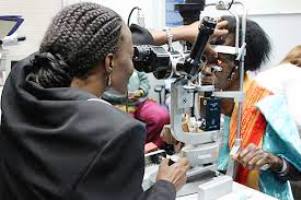An International NGO, Sightsavers Nigeria, has bemoaned poor access to eye treatment in rural area, in spite of Nigeria having the highest number of opthalmologists in Africa.
Its Country Director, Dr Sunday Isiyaku made this known on the sideline of media training on disability inclusion in Abuja.
Isiyaku, while stressing the need to improve access to health care services in the rural areas and for People with Disabilities (PWDs), urged the media to highlights their challenges to attract action towards resolving them.
“Nigeria is a very fortunate country. In Africa, we are the country that has the highest number of ophthalmologists which means that people should ordinarily have access to health services.
“However, they tend to concentrate more in the cities. And, so people who are in the rural areas or rural communities do not have access to it,” he said.
According to him, the organisation is committed towards ensuring PWDs have access to health services, financial independent and contributing to decision making.
He explained that several eye health and Neglected Tropical Diseases (NTDs) projects in collaboration with the government and other stakeholders were ongoing in the country.
Mr Williams Adamani, Country Technical Adviser on NTDs, said the organisation was collaborating with the federal government on onchocerciasis (river blindness), trachoma, lymphatic filariasis, schistosomiasis and soil transmitted helminthiasis.
Similarly, Dr Selben Penzin, Senior Programme Manager, listed policy and implementation, governance structure, human resources for eye health as some of the challenges of eye health system in Nigeria.
Penzin added that financing and cost, as well as service deliver access, including infrastructure as other challenges.
She, therefore, listed Child Eye Health project, Kogi Core Eye Health, Kogi Inclusive Eye Health, National Eye Health Programme, Plateau Inclusive Eye Health Project, Keep Sight Project and others to improve eye health system in the country.
Ms Esther Angulu, Social Inclusion Programme Manager, urged the media to create more awareness that would promote rights of PWDs.
Angulu said the organisation was working towards improving Inclusive health, inclusive education, economic empowerment and other socal inclusion projects for PWDs.
On her part, Mrs Esther Bature, Country Advocacy Coordinator, encouraged the media to use appropriate terms, while reporting issues around PWD.


